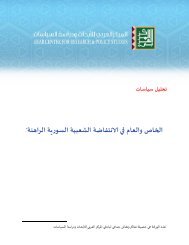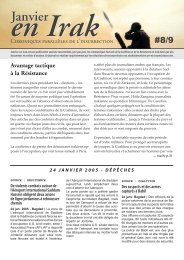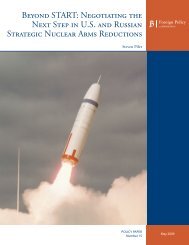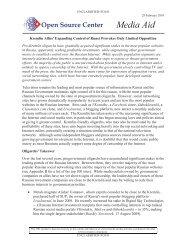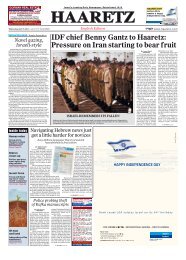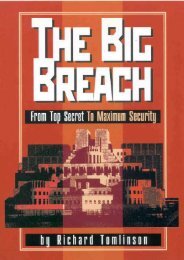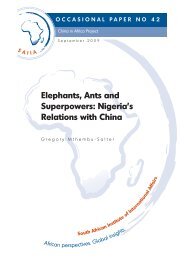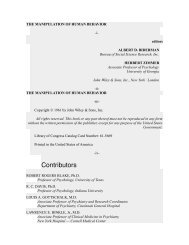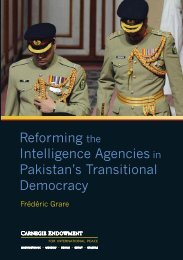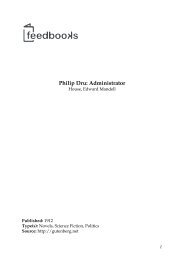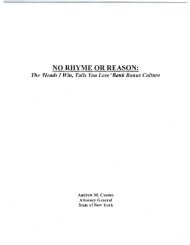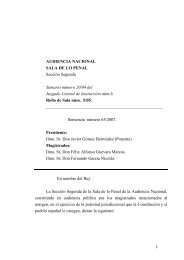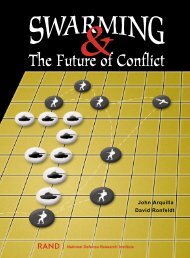Turkey's Perspectives on Nuclear Weapons and Disarmament.pdf
Turkey's Perspectives on Nuclear Weapons and Disarmament.pdf
Turkey's Perspectives on Nuclear Weapons and Disarmament.pdf
- No tags were found...
You also want an ePaper? Increase the reach of your titles
YUMPU automatically turns print PDFs into web optimized ePapers that Google loves.
TURKEY | 67TURKEY’S PERSPECTIVES ON NUCLEARWEAPONS AND DISARMAMENTHenri J. BarkeyIn principle, Turkey would welcome the global eliminati<strong>on</strong> of nuclear weap<strong>on</strong>s. For thecurrent government, the possessi<strong>on</strong> of nuclear weap<strong>on</strong>s by other states is a factor that,indirectly at least, reduces Turkey’s regi<strong>on</strong>al (if not global) aspirati<strong>on</strong>s <strong>and</strong> power. However,in the medium term, it remains deeply ambivalent <strong>on</strong> the future of nuclear weap<strong>on</strong>s <strong>and</strong> itsown plans regarding nuclear energy <strong>and</strong> weap<strong>on</strong>s development.Turkey lacks a coherently articulated nati<strong>on</strong>al policy vis-à-vis nuclear weap<strong>on</strong>s. This ispartly due to the fact that as a member of NATO it is a direct beneficiary of the US nuclearumbrella <strong>and</strong> because the United States maintains a number of nuclear weap<strong>on</strong>s at theIncirlik Air Force base in southern Turkey. 1 The absence of such a policy is also the result ofthe unclear demarcati<strong>on</strong> of lines of authority between civilian <strong>and</strong> military leaders <strong>on</strong> issuesof nati<strong>on</strong>al defense. While this may not have been a problem in the past, civil-militaryrelati<strong>on</strong>s have been strained under the current ruling government, led by the Justice <strong>and</strong>Development Party (AKP). Until recently, when it came to setting nati<strong>on</strong>al priorities, themilitary establishment’s role could best be described as primus inter pares. The AKP’spreoccupati<strong>on</strong> with exp<strong>and</strong>ing Turkey’s role in the regi<strong>on</strong> <strong>and</strong> its push to reform Turkishstate structures, including the military’s prerogatives, are radically challenging the military’sc<strong>on</strong>trol of the nati<strong>on</strong>al security agenda.WHAT FACTORS MIGHT MOTIVATE TURKEY TO ACQUIRENUCLEAR WEAPONS?Any discussi<strong>on</strong> of Turkey’s approach to nuclear weap<strong>on</strong>s—whether it is to support aninitiative such as “Global Zero” or to acquire them—has to be studied in the c<strong>on</strong>text of thetransformati<strong>on</strong> it is undergoing: Turkey is not just a dynamic emerging market ec<strong>on</strong>omy, but<strong>on</strong>e that c<strong>on</strong>tains deep divisi<strong>on</strong>s am<strong>on</strong>g domestic political forces that are battling for the veryessence of the country, its identity, <strong>and</strong> future directi<strong>on</strong>. Aggravating the current dividebetween arch-secularists <strong>and</strong> a coaliti<strong>on</strong> of liberals <strong>and</strong> more religiously c<strong>on</strong>servative groupsis a deepening ethnic cleavage—Kurds against majority Turks. For some or all protag<strong>on</strong>istsinvolved, the issues at h<strong>and</strong> are existential in nature <strong>and</strong> compromise is difficult to achieve.Parallel to these is the fact that Turkey’s immediate security envir<strong>on</strong>ment has been, <strong>and</strong>c<strong>on</strong>tinues to be, in a state of flux. The war in Iraq has had a direct impact <strong>on</strong> Turkey, in partdue to Turkey’s past policies with regards to its own Kurdish minority. Ankara feelsthreatened by the emergence of a federal (if not bi-nati<strong>on</strong>al) Iraq that c<strong>on</strong>tains a robustKurdish comp<strong>on</strong>ent. Most Turkish military thinking has been dominated by the threat posedby Kurdish developments <strong>and</strong> the domestic Kurdistan Workers’ Party (PKK)-led insurgency
68 | BARKEYwhich, after 20 years, shows few signs of dying out. In fact, until a new foreign policy wasformed by the AKP government, much of Turkey’s foreign policy c<strong>on</strong>siderati<strong>on</strong>s weredominated by the Kurdish questi<strong>on</strong> <strong>and</strong> the need to combat the PKK.Another important transformati<strong>on</strong>al development is Turkey’s <strong>on</strong>going applicati<strong>on</strong> to join theEuropean Uni<strong>on</strong> (EU). The EU membership process has already forced Turkey to makesignificant changes to its domestic instituti<strong>on</strong>s, including <strong>on</strong> issues of the rule of law <strong>and</strong>minority rights. However, Ankara has a l<strong>on</strong>g road ahead to comply fully with EUrequirements including, perhaps most importantly, far more sweeping changes to Turkey’sorganizati<strong>on</strong>al structure, including civil-military relati<strong>on</strong>s. The EU membership process,with close scrutiny of Ankara’s behavior, is <strong>on</strong>e of several factors acting as a c<strong>on</strong>straint <strong>on</strong>potential Turkish nuclear ambiti<strong>on</strong>s.Security C<strong>on</strong>cernsAs a NATO member <strong>and</strong> US ally, Turkey has enjoyed the protecti<strong>on</strong> extended by USnuclear guarantees—the so-called “nuclear umbrella.” Extended nuclear deterrence wasprimarily designed to protect Turkey from the Soviet Uni<strong>on</strong>, <strong>and</strong> with the collapse of theSoviet state, the nuclear issue lost its relevance. In fact, even before the end of the SovietUni<strong>on</strong>, the US had begun to progressively reduce its nuclear weap<strong>on</strong>ry in Europe <strong>and</strong> towithdraw from installati<strong>on</strong>s that had housed these weap<strong>on</strong>s. Turkey, al<strong>on</strong>g with four otherEuropean countries, maintain US nuclear weap<strong>on</strong>s; some 90 tactical weap<strong>on</strong>s are stored atthe Incirlik Air Force base near the southern city of Adana pursuant to the 1999 NATOstrategic c<strong>on</strong>cept that envisaged a “minimum level sufficient to preserve peace <strong>and</strong>stability.” 2How credible today are the US <strong>and</strong> NATO’s nuclear guarantees to Ankara? After thedemise of the Soviet Uni<strong>on</strong>, Turkey’s security threat percepti<strong>on</strong>s shifted away from the ColdWar calculati<strong>on</strong>s of the threat posed by the Warsaw Pact to its immediate neighborhood <strong>and</strong>specifically the Middle East. Even Turkey’s age-old c<strong>on</strong>flict with Greece has eased asAthens made a strategic choice to support Turkey’s EU applicati<strong>on</strong> as a means to c<strong>on</strong>tain, ifnot eliminate, the perceived Turkish threat. Ir<strong>on</strong>ically, Ankara sees its primary threat to bean internal <strong>on</strong>e with foreign linkages. The possibility of Kurdish secessi<strong>on</strong>, as difficult asthis may be to imagine, is the primary threat that drives Turkey’s security policies. This hasbecome even more pr<strong>on</strong>ounced in the aftermath of the 2003 Iraq War, as Iraqi Kurds, whohad already enjoyed a de facto quasi-independent status since the 1991 crisis with Iraq overKuwait, gained official recogniti<strong>on</strong> within Iraq with the creati<strong>on</strong> of a federal Iraqi state.In recent years, some Turks have begun to questi<strong>on</strong> the effectiveness of the NATO/USsecurity umbrella. In part, this is due to the reluctance <strong>and</strong> sluggishness with which someNATO members resp<strong>on</strong>ded to Turkey’s request for military deployments during the 1991Iraq/Kuwait crisis. Then “some NATO allies questi<strong>on</strong>ed the need to deploy even tokenreinforcements to Turkey.” 3 Growing anti-Americanism in Turkey has also exacerbated the
TURKEY | 69general lack of c<strong>on</strong>fidence in Western (specifically American) security guarantees. * Someleading Turkish military officials have even suggested that Turkey ought to rethink itsalliance commitments. 4 Anti-Western sentiment is also reinforced by the c<strong>on</strong>stant drumbeatof reports that Europeans <strong>and</strong> Americans are not doing enough to combat the PKK.In c<strong>on</strong>templating c<strong>on</strong>venti<strong>on</strong>ally armed foes, the Turkish armed forces are quite competent.For example, the first post-Cold War dem<strong>on</strong>strati<strong>on</strong> of Turkish military prowess occurred in1998 when the Turks threatened Syria with military interventi<strong>on</strong> unless it stopped providingthe PKK’s leader, Abdullah Öcalan, with refuge in Damascus <strong>and</strong> Syrian-c<strong>on</strong>trolled parts ofLeban<strong>on</strong>. With most of its divisi<strong>on</strong>s facing south against Israel, Syria quickly capitulated<strong>and</strong> sent Öcalan <strong>on</strong> his way—a decisi<strong>on</strong> that ended with his capture <strong>and</strong> impris<strong>on</strong>ment byTurkish officials. With the capture of Öcalan <strong>and</strong> further political changes in both Turkey<strong>and</strong> Syria, relati<strong>on</strong>s between the two governments have improved significantly. 5However, in the absence of any nuclear weap<strong>on</strong>s of its own, when it comes to c<strong>on</strong>templatingthreats from nuclear-armed nati<strong>on</strong>s, Turkey has little else to rely <strong>on</strong> other than NATO’sguarantees. This might be relevant in c<strong>on</strong>sidering the possibility of a revanchist Russia, orscenarios in which Iran <strong>and</strong>/or Syria acquire nuclear weap<strong>on</strong>s. Hence, despite the discordantvoices emanating from various groups, Turks c<strong>on</strong>tinue to rely <strong>on</strong> the American securityumbrella. Ankara has always stressed the importance of its NATO commitments.Moreover, as will be discussed below, there is no easy way for Turkey to obtain suchweap<strong>on</strong>s, even assuming it was willing to forsake its alliance <strong>and</strong> treaty pledges. It currentlyhas no nuclear power plants <strong>and</strong> <strong>on</strong>ly the beginnings of a research/technical infrastructure.What has made the Turkish military a potent force has been its NATO links. Thecombinati<strong>on</strong> of NATO, a robust army, <strong>and</strong> a willingness to take security seriously has servedeffectively as Turkey’s primary form of deterrence.In c<strong>on</strong>sidering the possibility of a nuclear-armed Iran, Turkey has often stressed that it hasenjoyed a peaceful border with Iran dating back to the Qasr-i Shirin Treaty of 1639.Although Ankara routinely complained in the 1990s that Tehran was aiding <strong>and</strong> abetting thePKK’s activities in Turkey, the two nati<strong>on</strong>s actively collaborated politically to c<strong>on</strong>tain the defacto Kurdish entity in northern Iraq that the Gulf War allies protected. In more recent years,moreover, Turkey <strong>and</strong> Iran claim to have made comm<strong>on</strong> cause against both the PKK <strong>and</strong> itsIranian affiliate, The Party of Free Life of Iranian Kurdistan (PJAK), occasi<strong>on</strong>ally evencoordinating artillery strikes. † Unlike Israel <strong>and</strong> Saudi Arabia, no <strong>on</strong>e in Turkey perceives* A Pew poll in 2007 had found that with <strong>on</strong>ly 12 percent of the resp<strong>on</strong>dents in favor, Turkish support for Americawas the lowest am<strong>on</strong>g most countries. http://pewglobal.org/reports/display.php?ReportID=252.† Turkey’s willingness to acknowledge such cooperati<strong>on</strong> publicly is designed to send Washingt<strong>on</strong> a message thateven the military is willing to deal with the much-disliked regime in Tehran when it comes to the Kurdish questi<strong>on</strong>.The Turkish military had been frustrated until the end of 2007 by American unwillingness to allow Turkish forces totarget PKK encampments in northern Iraq. The PKK has been fighting the Turkish authorities since 1984; it reachedits zenith in 1991. Based initially in Syria, the PKK also established rear bases in Iran <strong>and</strong> Iraq. While itseffectiveness has been severely curtailed by years of Turkish counterinsurgency operati<strong>on</strong>s, it remains a potent forceable to harass security forces. PJAK, the Iranian offshoot of the PKK, is far smaller <strong>and</strong> extremely dependent <strong>on</strong> thePKK. It has benefited from the absence of other Kurdish insurgent groups in Iran, but it too has faced a growingIranian military counterinsurgency campaign. For a detailed analysis of the Turkish-Kurdish relati<strong>on</strong>s please see
70 | BARKEYIran as representing an existential threat to Turkey. As Turkish columnist Cüneyt Ülseverargued, Turkey <strong>and</strong> Iran are two imperial powers with leadership ambiti<strong>on</strong>s in the MiddleEast, but if they have not fought much between them, it is because neither can decisivelydefeat the other. 6Iran’s acquisiti<strong>on</strong> of nuclear weap<strong>on</strong>s, of course, could alter this deterrent balance <strong>and</strong> theTurkish secular establishment harbors serious reservati<strong>on</strong>s about Iran’s intenti<strong>on</strong>s. The 1979Iranian Islamic Revoluti<strong>on</strong> was an eye opener for many in Turkey who feared that their ownIslamists would emulate this path. Indeed, Turkish authorities accused Iran of trying tofoment domestic unrest by encouraging Turkish Islamic groups to even engage in violentactivities. The advent of AKP <strong>and</strong> the electi<strong>on</strong> of its leader, Recep Tayyip Erdogan, asTurkey’s Prime Minister, however, have dramatically changed the relati<strong>on</strong>ship. The currentgovernment in Ankara, as opposed to establishment Turks, has a more benign view ofTehran. It has g<strong>on</strong>e out of its way to accommodate Iranian c<strong>on</strong>cerns <strong>and</strong> sought to increasetrade <strong>and</strong> deepen bilateral relati<strong>on</strong>s. As a result, Turkish-Iranian relati<strong>on</strong>s are enjoying theirbest period since 1979. 7 AKP’s self-c<strong>on</strong>fidence has also manifested itself in a desire tobecome an intermediary between the West <strong>and</strong> Tehran <strong>on</strong> all matters, but especially <strong>on</strong> thenuclear file. ‡That said, Turkey is opposed to a nuclear Iran. A nuclear Iran would be likely to upset theregi<strong>on</strong>al balance of power. Already, by removing <strong>on</strong>e of Tehran’s most bitter enemies,Saddam Hussein, <strong>and</strong> by bringing to power a Sh’ia regime in Baghdad, the war in Iraq hasdrastically improved Iran’s geopolitical st<strong>and</strong>ing in the regi<strong>on</strong>. Because Iran is a revisi<strong>on</strong>istpower, some Turks fear that its acquisiti<strong>on</strong> of nuclear weap<strong>on</strong>s would be likely to make it farmore self-c<strong>on</strong>fident <strong>and</strong>, therefore, adventurous in its regi<strong>on</strong>al relati<strong>on</strong>s. §There is, however, a divisi<strong>on</strong> between the government <strong>and</strong> the security establishmentregarding Iranian intenti<strong>on</strong>s. The government <strong>and</strong> most of the Turkish public do notperceive the Iranian nuclear program as a serious threat to Turkey. This, in large measure, isdue to the fact that the US has taken the lead in adm<strong>on</strong>ishing Iran <strong>and</strong> trying to force it tocomply with IAEA regulati<strong>on</strong>s <strong>and</strong> NPT agreements. Both the government <strong>and</strong> public arecompletely opposed to an American (or possibly Israeli) strike <strong>on</strong> Iranian nuclearinstallati<strong>on</strong>s. ** One other factor bearing <strong>on</strong> Turkish decisi<strong>on</strong>-making <strong>and</strong> policy formulati<strong>on</strong>is the absence of independent Turkish capabilities to collect, analyze, <strong>and</strong> assess intelligenceHenri J. Barkey, Preventing C<strong>on</strong>flict over Kurdistan (Washingt<strong>on</strong>, DC: Carnegie Endowment for Internati<strong>on</strong>al Peace,2009).‡ In seeking support for Turkish diplomatic overtures towards Iran, a high-ranking Turkish foreign policy official hasoften stressed in private communicati<strong>on</strong>s to his American interlocutors that “no <strong>on</strong>e knows Iran better than Turkey.”§ Three Turkish parliamentarians told a C<strong>on</strong>gressi<strong>on</strong>al staff delegati<strong>on</strong> visiting Turkey that were Iran to go nuclear,Turkey would follow suit. How representative this sample might be, however, is debatable. See: Chain Reacti<strong>on</strong>:Avoiding a <strong>Nuclear</strong> Arms Race in the Middle East (Washingt<strong>on</strong>, DC: Committee <strong>on</strong> the Foreign Relati<strong>on</strong>s of theUnited States, Senate, February 2008), page 41.** Interestingly, the Turkish government took a very low-key approach to the September 2007 Israeli raid <strong>on</strong> Syria’snuclear installati<strong>on</strong>. In part because the Syrians decided to underplay the event themselves, <strong>and</strong> despite stories thatIsraeli jets had ditched their empty fuel tanks over Turkish territory, when asked about it Prime Minister Erdogansimply said, “we talked to both sides <strong>and</strong> they both denied that there was a violati<strong>on</strong> of our airspace,” HaberX (April26, 2008).
TURKEY | 71<strong>on</strong> nuclear issues. As a result, Turkey is dependent <strong>on</strong> outside sources, namely the US,IAEA, <strong>and</strong> NATO for its informati<strong>on</strong>. This both helps <strong>and</strong> c<strong>on</strong>strains US influence; to thedegree that the US provides the informati<strong>on</strong>, Turks develop an aversi<strong>on</strong> to the US agenda <strong>on</strong>the issue. Moreover, the United States’ credibility problem following the WMD debacle inIraq <strong>and</strong> the general lack of sympathy for the US in Turkey has made it difficult for thegovernment, assuming it is alarmed by developments in Iran, to assume a vocal <strong>and</strong> pro-American stance in this issue.The AKP <strong>and</strong> much of its leadership rose through the ranks of more hard-line Islamistmovements. Even though Prime Minister Erdogan <strong>and</strong> company broke with the old guard,represented by Necmettin Erbakan, a former prime minister <strong>and</strong> father of the Islamistmovement in Turkey, the current AKP leadership still perceives the world through areligiously tinted lens. Erbakan, during his short stint as prime minister, tried very hard tocreate a grouping of Islamic states, called the D-8, which was intended to rival the G-8assemblage of ec<strong>on</strong>omically advanced Western nati<strong>on</strong>s. Erbakan <strong>and</strong> his lieutenants extolledthe virtues of an Islamic NATO <strong>and</strong> Islamic Uni<strong>on</strong>, complete with its own currency. Notsurprisingly, Erbakan <strong>and</strong> his supporters, though much diminished in size <strong>and</strong> influence,fully support Iran’s quest for nuclear power <strong>and</strong> weap<strong>on</strong>ry. While this justificati<strong>on</strong> iscouched in the form of Iran’s need to deter the United States, underlying this wish is alsotheir percepti<strong>on</strong> of a civilizati<strong>on</strong>al struggle between East <strong>and</strong> West. ††Current Turkish political leaders often resp<strong>on</strong>d to c<strong>on</strong>cerns expressed about Iran with asimilar refrain: Iran has the right to access nuclear technology provided it is for peacefulpurposes. ‡‡ Often, Turkish political leaders raise the issue of Israeli nuclear weap<strong>on</strong>s; in2006 then foreign <strong>and</strong> deputy prime minister, Abdulah Gül, in his party’s annual meeting,argued that if Iranian nuclear weap<strong>on</strong>s are dangerous, then so are the Israeli <strong>on</strong>es. 8 Whenasked about the Iranian nuclear effort, Prime Minister Erdogan, <strong>on</strong> a visit to Washingt<strong>on</strong> inlate 2008, resp<strong>on</strong>ded by being as critical of the United States as he was of Iran. He said that“those who counsel Iran not to acquire nuclear weap<strong>on</strong>s, should themselves not have theseweap<strong>on</strong>s in the first place.” 9On the other h<strong>and</strong>, Turkey wants a quiet <strong>and</strong> stable neighborhood in order to accomplish itsdevelopmental goals— after decades of ec<strong>on</strong>omic ups <strong>and</strong> downs it has finally managed toput together a c<strong>on</strong>sistent record of ec<strong>on</strong>omic growth—<strong>and</strong> EU accessi<strong>on</strong>. Turkey has triedhard to become an energy (especially gas) c<strong>on</strong>duit between the energy-rich producers ofAzerbaijan, Iran, Turkmenistan, <strong>and</strong> Russia, <strong>on</strong> the <strong>on</strong>e h<strong>and</strong>, <strong>and</strong> an energy-hungry Europe,<strong>on</strong> the other. Its own domestic needs are being supplied in part by Iran.†† The mouthpiece of the current party established by Erbakan, the Felicity party, is the daily Milli Gazete, whichpublished a l<strong>on</strong>g analytical article supporting the Iranian quest for nuclear capabilities <strong>on</strong> November 24, 2005.‡‡ Occasi<strong>on</strong>ally, there are expressi<strong>on</strong>s to the c<strong>on</strong>trary, as was the case with the AKP chairman of the parliamentaryforeign policy committee, Murat Mercan, who <strong>on</strong> a trip to Israel suggested that Iran was first <strong>and</strong> foremost a threat toTurkey, Haaretz (December 12, 2008). Two days later, the Iranian News Agency, IRNA, posted a correcti<strong>on</strong> byMercan <strong>on</strong> its Turkish website, http://www1.irna.ir/tr/news/view/line-6/0812128992144327.htm.
72 | BARKEYAn Iranian nuclear weap<strong>on</strong>s program might st<strong>and</strong> in the way of both Turkish ec<strong>on</strong>omicdevelopment <strong>and</strong> EU accessi<strong>on</strong> if the Middle East were plunged into a serious armscompetiti<strong>on</strong>. This is why the Turks have stated their support for the UN process <strong>and</strong> inAugust 2005 allowed Britain, speaking <strong>on</strong> behalf of the EU, to issue a statement for Turkey,as <strong>on</strong>e of the prospective member countries, at the IAEA board of governors meetingsupporting the EU diplomatic initiative to c<strong>on</strong>tain the Iranian uranium enrichment process,known as the E-3. Iran was quite displeased by Turkey’s acti<strong>on</strong>. 10The security establishment, by c<strong>on</strong>trast, has a more jaundiced view of Iran. In 2005, as hewas about to leave his post as Turkish Ambassador to Washingt<strong>on</strong>, Faruk Logoglu, a formerMinistry of Foreign Affairs undersecretary, pointedly argued that Iran is inexorably movingtowards the acquisiti<strong>on</strong> of nuclear weap<strong>on</strong>s <strong>and</strong> that the European efforts at c<strong>on</strong>taining thisdevelopment would fail. 11 Turkish military officials have also been blunt about theirc<strong>on</strong>cerns regarding the Iranian nuclear program. The Turkish General Staff perceives Iran asan ideological enemy; a theocratic state bent <strong>on</strong> undermining the secular basis of Turkey <strong>and</strong>of the regi<strong>on</strong>. In a speech in Washingt<strong>on</strong>, given while he was deputy chief of staff, thecurrent chief of the armed forces, General Ilker Basbug, argued that Turkey, just as theUnited States, was following Iran’s nuclear activities with apprehensi<strong>on</strong>. 12 In his departurespeech, a former chief of staff, General Hilmi Özkök, without menti<strong>on</strong>ing Iran by name,warned that “unless the crisis over nuclear weap<strong>on</strong>s is not resolved diplomatically, [Turkey]would so<strong>on</strong> be faced with important strategic choices. Otherwise, we would be faced withthe possibility of losing our strategic superiority in the regi<strong>on</strong>.” 13 This sentiment is echoedby voices associated with the nati<strong>on</strong>alist camp in Turkey who fret about Iran’s increasedinfluence, not <strong>on</strong>ly in the Middle East but also in Central Asia <strong>and</strong> the Caucasus, <strong>and</strong>especially in Azerbaijan. 14Like the politicians, though, the security establishment opposes any military acti<strong>on</strong> toforcibly eliminate Iran’s nuclear weap<strong>on</strong>s. Of most c<strong>on</strong>cern to them is the possibility of arepeat of the after-effects of the Iraq War, which completely undermined the status quo in theregi<strong>on</strong> <strong>and</strong> gave further momentum to the Kurdish issue. Similarly, a US strike againstIranian installati<strong>on</strong>s is likely to upset domestic balances in Iran <strong>and</strong> unleash a series ofunpredictable c<strong>on</strong>sequences that would likely further undermine regi<strong>on</strong>al stability. Hence,the Turkish military is caught between its desire to see a diplomatic initiative succeed <strong>and</strong> thevery real prospect that such an endeavor will fail <strong>and</strong> Iran will ultimately achieve nuclearweap<strong>on</strong>s status.This may also explain why Turkey has not experienced the public debates <strong>on</strong> the removal ofnuclear weap<strong>on</strong>s from its territory. Of the four other n<strong>on</strong>-nuclear European states—Italy,Germany, Belgium, <strong>and</strong> the Netherl<strong>and</strong>s—that c<strong>on</strong>tinue to store US nuclear weap<strong>on</strong>s, <strong>on</strong>lyBelgium <strong>and</strong> Germany have had extensive parliamentary debates <strong>on</strong> the pros <strong>and</strong> c<strong>on</strong>s ofmaintaining them. 15The advent of an Iranian nuclear device would not automatically change Turkey’s approachto nuclear weap<strong>on</strong>s. However, it would certainly unleash a br<strong>and</strong> new debate in the country
TURKEY | 73because, to date, the discussi<strong>on</strong> in Turkey has remained c<strong>on</strong>jectural <strong>and</strong>, with few realspecialists <strong>on</strong> the subject, has had a somewhat unreal quality to it. Two factors willdetermine the future course of acti<strong>on</strong>: first, regi<strong>on</strong>al development pursuant to Iran’snuclearizati<strong>on</strong> <strong>and</strong>, sec<strong>on</strong>d, which of Turkey’s domestic political parties is in power at thetime.Turkey’s reacti<strong>on</strong> would not be solely c<strong>on</strong>tingent <strong>on</strong> Iran’s behavior. After all, Turkeybenefits—<strong>and</strong> presumably will c<strong>on</strong>tinue to do so for some time in the future—from thenuclear umbrella offered by the United States. However, there are indicati<strong>on</strong>s that an Iranianbomb would lead to a regi<strong>on</strong>al nuclear arms race, which could trigger a Turkish nuclearprogram.The Saudis, who feel the most threatened by Iran’s nuclear, c<strong>on</strong>venti<strong>on</strong>al, <strong>and</strong> revoluti<strong>on</strong>aryambiti<strong>on</strong>s, are likely to try to follow Iran if it develops nuclear weap<strong>on</strong>s. Saudi Arabia hasalready intimated that it would seek its own warheads in the event Iran goes nuclear. 16Turkey could also be encouraged by the Saudis to seek its own path to nuclear weap<strong>on</strong>ry.Even though Turkey has recently sided with the more radical elements in the regi<strong>on</strong> overGaza, the Turks would also be worried about the burge<strong>on</strong>ing ‘Shia Crescent,’ stretching fromthe Palestinian territories to Pakistan. Turkey c<strong>on</strong>siders such a divisi<strong>on</strong> dangerous for thesecurity <strong>and</strong> stability of the regi<strong>on</strong> as a whole, <strong>and</strong> aims to bridge the gap between SunniArab states <strong>and</strong> Iran. 17Moreover, an Iranian bomb may compel Israel to come out of its nuclear closet to deter Iran.In turn, as Robert Einhorn has argued, such a development would undermine the unspokenarrangement that has ruled the Egyptian-Israeli relati<strong>on</strong>ship to date. Despite its boisterousdenunciati<strong>on</strong>s of the Israeli nuclear program, Egypt has put its nuclear ambiti<strong>on</strong>s <strong>on</strong> a backburneras l<strong>on</strong>g as Israel maintains its ambiguous st<strong>and</strong> about its program. If Israel were to gopublic with its arsenal in resp<strong>on</strong>se to an Iranian bomb, it would risk reigniting Egypt’snuclear effort. 18 An Iranian nuclear weap<strong>on</strong> would certainly set back the cause of creating a<strong>Nuclear</strong> Weap<strong>on</strong> Free Z<strong>on</strong>e in the Middle East for decades <strong>and</strong> might even trigger a rush toemulate Tehran. Even in the event of a Palestinian-Israeli peace agreement, Iran’s questwould represent a sufficient shock to the system to engender such a reacti<strong>on</strong>.The likelihood that Turkey would seek its own path to a nuclear capability, however l<strong>on</strong>gthis might take, would increase in the event of such a regi<strong>on</strong>al nuclear arms race. Domesticpolitical pressure <strong>and</strong> the regi<strong>on</strong>’s anarchic character would be sufficient to propel anyTurkish government to begin its own program. In the meantime, the presence of USweap<strong>on</strong>s <strong>on</strong> its soil would serve as a security bridge.On the other h<strong>and</strong>, were the United States to remove its nuclear weap<strong>on</strong>s from Europealtogether, Turkish calculati<strong>on</strong>s would be altered drastically. Their presence, as David Yostpoints out, has helped Europe, especially Turkey, to c<strong>on</strong>nect to NATO strategy <strong>and</strong>c<strong>on</strong>tribute to collective decisi<strong>on</strong>-making. 19 Their removal therefore could severely shakec<strong>on</strong>fidence in the c<strong>on</strong>cept of extended deterrence. In the eyes of experts <strong>and</strong> European
74 | BARKEYsecurity officials, weap<strong>on</strong>s based in Europe are c<strong>on</strong>sidered far more important to maintaininga deterrent posture than weap<strong>on</strong>s <strong>on</strong> US soil or at sea. 20The sec<strong>on</strong>d factor that could encourage Turkey to develop a nuclear capability would be itsdomestic politics. The AKP has tried hard to positi<strong>on</strong> itself as a regi<strong>on</strong>al leader; it takespride in its ability to intervene in regi<strong>on</strong>al c<strong>on</strong>flicts <strong>and</strong> offer its services as a state imbuedwith soft power to help resolve them. It has even offered its services to the United States <strong>and</strong>Iran. AKP’s bid for regi<strong>on</strong>al influence has struck a chord with the Turkish public. PrimeMinister Erdogan has been its primary beneficiary <strong>and</strong> has carefully tailored these diplomaticinitiatives to a rise in Turkish nati<strong>on</strong>alism. He <strong>and</strong> his current government have d<strong>on</strong>e much tostoke <strong>and</strong> ride the nati<strong>on</strong>alist wave. This was most evident in the dramatic theater heengineered over Israel’s Gaza incursi<strong>on</strong>.A nuclear arms race in the regi<strong>on</strong> in which Turkey remained <strong>on</strong> the sidelines, lost influence,<strong>and</strong> relied <strong>on</strong> American security guarantees raises the prospect of a str<strong>on</strong>g nati<strong>on</strong>alistbacklash. If this were coupled with disillusi<strong>on</strong>ment over the prospects for membership in theEuropean Uni<strong>on</strong>, the government might be unable to withst<strong>and</strong> a groundswell fornuclearizati<strong>on</strong>. Fundamentally, predicting how Turkey would react to a future Iraniannuclear weap<strong>on</strong> depends in part in the directi<strong>on</strong> Turkey takes in the near future: Will itendure the difficult transiti<strong>on</strong> to a modern European-like state while getting ever so close tomembership in the EU, or will it be tempted by opportunities to make a bid for regi<strong>on</strong>alleadership? As an EU member it would have much less reas<strong>on</strong> to worry about the changingregi<strong>on</strong>al balance of power—<strong>and</strong> the powerful c<strong>on</strong>straints <strong>on</strong> its ability to break currentcommitments in the NPT <strong>and</strong> other agreements to remain n<strong>on</strong>-nuclear.Were Iran to cross the nuclear threshold <strong>on</strong>e day, what would Turkey do? On the assumpti<strong>on</strong>that it cannot st<strong>and</strong> still <strong>and</strong> do nothing, it has three choices:1. Multilateral defense opti<strong>on</strong>: It could strengthen its ties with the US. Turkey isalready part of the NATO alliance <strong>and</strong> therefore Ankara benefits from the USnuclear umbrella <strong>and</strong> already has nuclear weap<strong>on</strong>s <strong>on</strong> its soil. 21 In order to improveits deterrent capacities, it might seek to reinforce these ties, seeking extradiplomatic <strong>and</strong> political assurances <strong>and</strong> asking for more advanced weap<strong>on</strong>ry fromthe US, including state-of-the-art anti-missile technology <strong>and</strong> advanced aircraft. Itmight also appeal to the EU to strengthen its defense-related instituti<strong>on</strong>s <strong>and</strong> evenspeed up the accessi<strong>on</strong> negotiati<strong>on</strong>s. In other words, under this opti<strong>on</strong>, Turkeywould seek to bolster its existing defense agreements <strong>and</strong> might even push the USto declare publicly <strong>and</strong> officially the presence of nuclear weap<strong>on</strong>s <strong>on</strong> Turkish soil.2. Go nuclear opti<strong>on</strong>: This could not be achieved quickly. As will be described below,Turkey does not have the technical wherewithal to produce nuclear weap<strong>on</strong>sanytime so<strong>on</strong>. It can decide to make the necessary investments, but it would taketime <strong>and</strong> resources to reach fruiti<strong>on</strong>. Moreover, Turkey does not have thepossibility of pursuing this opti<strong>on</strong> cl<strong>and</strong>estinely because of the close relati<strong>on</strong>ships it
TURKEY | 75has developed with the United States <strong>and</strong> Europe over the years, making thecountry fairly transparent. An open nuclear endeavor would risk alienating theEuropeans <strong>and</strong> Americans, but a covert program would do so even more. Duringthe Reagan Administrati<strong>on</strong>, the United States was very c<strong>on</strong>cerned about theexistence of a nuclear supply relati<strong>on</strong>ship between Pakistan <strong>and</strong> Turkey. PresidentReagan <strong>and</strong> his aides warned the Turks in a number of different settings about thisrelati<strong>on</strong>ship until means for greater cooperati<strong>on</strong> between the two countries wereinstituted. 22 Ankara is intent <strong>on</strong> being far more cautious <strong>on</strong> this fr<strong>on</strong>t; in June 2008,Turkish officials met a visiting Syrian energy minister’s suggesti<strong>on</strong> for nuclearcooperati<strong>on</strong> between Turkey <strong>and</strong> Syria with silence. 233. Regi<strong>on</strong>al diplomatic attack opti<strong>on</strong>: The Turkish ruling party has a great deal ofc<strong>on</strong>fidence in its own st<strong>and</strong>ing in the regi<strong>on</strong>. Hence, it may choose to pursue anactive diplomatic route designed to isolate Iran. This could be d<strong>on</strong>e in c<strong>on</strong>cert withthe first opti<strong>on</strong>. The desired goal of isolating Iran would be to help trigger a changein regime or orientati<strong>on</strong> that would reverse the nuclear decisi<strong>on</strong>.N<strong>on</strong>e of these choices are particularly appealing or realistic, which suggest that the bestoutcome for Turkey would be for the current multilateral effort under UN auspices aimed atc<strong>on</strong>vincing Iran not to proceed with nuclearizati<strong>on</strong> to succeed.Regi<strong>on</strong>al <strong>and</strong> Global Ambiti<strong>on</strong>sTurkey has been experiencing a wave of nati<strong>on</strong>alism <strong>and</strong> prickliness. The public has becomemore xenophobic. The call for Turkey to be an unrivalled power in the regi<strong>on</strong> <strong>and</strong> bey<strong>on</strong>d isoften heard. An Iranian bomb is likely to galvanize <strong>and</strong> mobilize those who would like tosee Turkey go nuclear.The AKP government came to power arguing that Turkey punched far below its weight ininternati<strong>on</strong>al affairs. Previous governments (with the notable excepti<strong>on</strong> of Prime Minister,<strong>and</strong> later President, Turgut Özal) had avoided engagement with its immediate regi<strong>on</strong>assiduously. The AKP, by c<strong>on</strong>trast, trading <strong>on</strong> its more pious roots <strong>and</strong> oppositi<strong>on</strong> toTurkey’s secular establishment, decided to engage the regi<strong>on</strong>. While it took care to maintaingood relati<strong>on</strong>s with Israel, a fact that provided it with clout both in the immediate regi<strong>on</strong> <strong>and</strong>in Europe <strong>and</strong> America, the AKP government also signaled that its foreign policy approachwould be more encompassing <strong>and</strong> that it expected to have a seat at the table. Am<strong>on</strong>g itsgoals was greater representati<strong>on</strong> in internati<strong>on</strong>al instituti<strong>on</strong>s, including the UN SecurityCouncil, where for the first time since the early 1960s, it gained the chance to occupy <strong>on</strong>e ofthe n<strong>on</strong>-permanent seats for the two-year term.Under Prime Minister Erdogan, Turkey has had several recent diplomatic ventures. Theprime minister invited himself into the Russian-Georgian crisis without any c<strong>on</strong>sultati<strong>on</strong>swith the NATO allies or the EU. Following the 2006 Leban<strong>on</strong> war, he also c<strong>on</strong>vincedTurkey’s military to send troops to Leban<strong>on</strong> as part of a UN m<strong>on</strong>itoring missi<strong>on</strong>. Finally,Turkey became an important intermediary between Israel <strong>and</strong> Syria at a time when the Bush
76 | BARKEYAdministrati<strong>on</strong> seemed to have created a vacuum through its refusal to forcefully engage inthe regi<strong>on</strong>. Underlying the AKP approach is a c<strong>on</strong>ceptualizati<strong>on</strong> of Turkey’s role as gatewaybetween East <strong>and</strong> West. Ahmet Davutoglu, the eminence grise behind this approach, whountil his recent elevati<strong>on</strong> to Minister of Foreign Affairs served as an advisor to both theprime minister <strong>and</strong> the president, formulated a visi<strong>on</strong> for Turkey that has its two legsanchored in Europe <strong>and</strong> America, while reaching over to Asia <strong>and</strong> bey<strong>on</strong>d as a means ofbalancing its traditi<strong>on</strong>al alliances. In his visi<strong>on</strong>, Turkey deserves to be, <strong>and</strong> ought to be, aglobal player. 24 Moreover, Davutoglu has also pushed for a policy of “zero problems” withneighbors that commits Turkey to maintaining good relati<strong>on</strong>s at the highest levels withneighboring states. In fact, Turkey was <strong>on</strong>e of the few countries to immediately c<strong>on</strong>gratulateIranian President Ahmedinejad following his disputed 2009 reelecti<strong>on</strong> “victory.” This mayprove to be a problematic relati<strong>on</strong>ship for Turkey if the Iranian leadership, anxious tobuttress its domestic base after these tainted electi<strong>on</strong>s, were to decide to harden its positi<strong>on</strong><strong>on</strong> the nuclear questi<strong>on</strong> triggering an even deeper crisis with the internati<strong>on</strong>al community.Ir<strong>on</strong>ically, it is Prime Minister Erdogan’s criticisms of Israel, especially following theJanuary 2009 Gaza operati<strong>on</strong>, which elicited the greatest acclaim in the Arab street. Whilehe <strong>and</strong> Turkey have achieved greater visibility as a result, it is not altogether clear thatTurkey has limitless possibilities <strong>and</strong> that it does not make mistakes that can be costly overtime.Moreover, there are limits to Turkish influence deriving from its own domesticinc<strong>on</strong>sistencies <strong>and</strong> clashing ideas regarding its identity <strong>and</strong> place in the world. These willundoubtedly be accentuated both physically <strong>and</strong> psychologically by Iran becoming a nuclearpower. Iran’s achievement <strong>on</strong> the nuclear fr<strong>on</strong>t, it must be remembered, comes with a wholepanoply of other military-industrial accoutrements. For the Iranian nuclear deterrent orthreat to be effective, the weap<strong>on</strong> has to be accompanied by a delivery infrastructure. Whenit comes to l<strong>on</strong>g-range missiles, the Iranians, with North Korean support <strong>and</strong> advice fromRussian engineers, have already built an impressive array of potential delivery means. Thiswas dem<strong>on</strong>strated recently by Iran’s successful launch of a satellite into space. Turkey is farfrom achieving such capabilities.All of these developments have catapulted Iran into the forefr<strong>on</strong>t of a regi<strong>on</strong>al balance ofpower game. Iran’s progress <strong>on</strong> these fr<strong>on</strong>ts has made up for its relative weakness in thec<strong>on</strong>venti<strong>on</strong>al weap<strong>on</strong>s arena. By c<strong>on</strong>trast, the Turks have no indigenous capability tomanufacture missiles, much less launch satellites. For both of these, Ankara relies <strong>on</strong> theUnited States or the European Arianne program.One of the c<strong>on</strong>sequences of the Iranian nuclear program has been an increased interest innuclear power. Although Turkey has no nuclear power plants, global c<strong>on</strong>cerns over climatechange <strong>and</strong> the growing realizati<strong>on</strong> of Turkey’s dependence <strong>on</strong> imported hydrocarb<strong>on</strong>s tosatisfy its growing energy dem<strong>and</strong>s has spurred the government to seek tenders to build thefirst nuclear power plants. As Ilter Türkmen, a former foreign minister, pointed out, Turkeyhas fallen behind in nuclear knowledge <strong>and</strong> technical expertise. This, he argued, “wasincompatible with Turkey’s geopolitical st<strong>and</strong>ing <strong>and</strong> ec<strong>on</strong>omic potential. If neighbors were
TURKEY | 77intent <strong>on</strong> developing nuclear weap<strong>on</strong> technology, it behooved Turkey, at the very least, toacquire peaceful forms of nuclear technology.” 25 In March 2007, the government passedlegislati<strong>on</strong> approving the c<strong>on</strong>structi<strong>on</strong> <strong>and</strong> operati<strong>on</strong> of nuclear power plants. Str<strong>on</strong>goppositi<strong>on</strong> to such plants exists, however, which makes it difficult politically for thegovernment to go forward without paying a high political price.TURKEY’S NUCLEAR INFRASTRUCTURETurkey is a signatory to the NPT <strong>and</strong> signed <strong>on</strong> to the Additi<strong>on</strong>al Protocol in 2006. Turkeyhas <strong>on</strong>e research <strong>and</strong> two small experimental nuclear facilities. The main such installati<strong>on</strong> is<strong>on</strong> the outskirts of Istanbul at Küçük Çekmece. Built in 1962 <strong>and</strong> upgraded subsequently toa 5 megawatt research reactor, it provides isotopes <strong>and</strong> other services to the medical industry.The other two experimental facilities are situated near Ankara are straightforward researchlaboratories. 26However, Turkey has no nuclear power plants, despite studies that were started as early as1965 to explore building <strong>on</strong>e such plant. 27 Turkey has in the past expressed interest indeveloping a nuclear industry, but despite discussi<strong>on</strong>s with a variety of countries to forge away to collaborate, it has never managed to translate these efforts into c<strong>on</strong>crete acti<strong>on</strong>.<strong>Nuclear</strong> energy is an attractive source for Turkey given that it has to import almost all of itsenergy needs from abroad. It has a tiny amount of oil <strong>and</strong> can rely <strong>on</strong> hydropower for someof its needs. However, both the discussi<strong>on</strong> of climate change <strong>and</strong> the potential unreliabilityof its energy partners, including Iraq, Russia, Azerbaijan <strong>and</strong> Iran, have spurred Turkey totake a new look at nuclear power. In 2006, the Turkish Prime Minister announced thatTurkey would so<strong>on</strong> start building three nuclear plants that would become fully operati<strong>on</strong>alby 2015. However, these hopes are unlikely to materialize because of domestic oppositi<strong>on</strong>;the costs are high <strong>and</strong> there seems to be a lack of interest <strong>on</strong> the part of would-be investors.In September 2008, the government received <strong>on</strong>ly <strong>on</strong>e bid for its Akkuyu tender <strong>on</strong> theMediterranean coast. The <strong>on</strong>e bid, from a Russian company undermined the very noti<strong>on</strong> ofreducing Ankara’s energy dependence <strong>on</strong> Russia from which it purchases most of its gas. 28The government subsequently decided to postp<strong>on</strong>e its decisi<strong>on</strong> to whether to cancel thetender until after the March 2009 local electi<strong>on</strong>s. The AKP is n<strong>on</strong>etheless determined to goahead with nuclear energy because, as Prime Minister Erdogan has argued, this is vital forTurkey’s industrial competitiveness. 29 The government took a modest step in that directi<strong>on</strong>in August 2009. As part of a broader set of agreements <strong>on</strong> energy projects, Turkey <strong>and</strong>Russia agreed to reopen talks <strong>on</strong> civilian nuclear cooperati<strong>on</strong>.The nuclear cooperati<strong>on</strong> agreement Turkey signed with the United States <strong>on</strong> June 2, 2008 isdesigned to enhance the exchange of informati<strong>on</strong>, technology, research, <strong>and</strong> nuclear powerproducti<strong>on</strong> <strong>and</strong> could give a boost to Ankara’s nascent efforts. 30 President George W. Bush,when sending the bill to C<strong>on</strong>gress, commented that the agreement would “serve as a str<strong>on</strong>gincentive for Turkey to c<strong>on</strong>tinue its support for n<strong>on</strong>proliferati<strong>on</strong> objectives <strong>and</strong> enact futuresound n<strong>on</strong>proliferati<strong>on</strong> policies <strong>and</strong> practices. It will also promote closer political <strong>and</strong>ec<strong>on</strong>omic ties with a NATO ally, <strong>and</strong> provide the necessary legal framework for US industry
78 | BARKEYto make nuclear exports to <str<strong>on</strong>g>Turkey's</str<strong>on</strong>g> planned civil nuclear sector.” 31 President Bill Clint<strong>on</strong>had initiated this deal; however, its c<strong>on</strong>siderati<strong>on</strong> had been delayed by proliferati<strong>on</strong> c<strong>on</strong>cerns.Its reemergence may be due to American c<strong>on</strong>cerns that Turkey, pressured by growingdomestic energy dem<strong>and</strong>, will increasingly be tempted to seek Iranian gas sources.TURKISH ATTITUDES TOWARD NUCLEAR DISARMAMENTThere is not enough public informati<strong>on</strong> to evaluate Turkey’s likely stance if there were aserious effort by the United States <strong>and</strong> other nuclear weap<strong>on</strong> states to eliminate all nuclearweap<strong>on</strong>s <strong>on</strong> a global basis. However, what can be surmised from the discussi<strong>on</strong> above isthat Turkey would welcome such an initiative precisely because, in the absence of nucleararmedcountries, its industrial <strong>and</strong> c<strong>on</strong>venti<strong>on</strong>al military prowess would help increase itsinfluence in its immediate regi<strong>on</strong> <strong>and</strong> bey<strong>on</strong>d. The Turkish political leadership—as distinctfrom its military leadership—is far more at ease with what it perceives to be Turkey’s “softpower.” Much of Turkey’s opening to the regi<strong>on</strong> <strong>and</strong> its attempt at mediating internati<strong>on</strong>aldisputes comes from its c<strong>on</strong>victi<strong>on</strong> that it can tap its “soft power” reservoir. Provided that allcountries embark <strong>on</strong> such an initiative, Turkey can rightfully calculate that it st<strong>and</strong>s tobenefit, especially if Iran <strong>and</strong> Israel are de-nuclearized.One of Turkey’s foremost researchers <strong>on</strong> the nuclear questi<strong>on</strong> has even suggested that thetime had come for Turkey to rethink the presence of American nuclear weap<strong>on</strong>s <strong>on</strong> Turkishsoil. Mustafa Kibaroglu argues that the benefits derived from these weap<strong>on</strong>s (deterrence<strong>and</strong>, more importantly, the traditi<strong>on</strong>al argument that they represent an investment in goodrelati<strong>on</strong>s with the United States) would be exceeded by the benefits of their removal. Theweap<strong>on</strong>s not <strong>on</strong>ly represent a hazard, he maintains, <strong>and</strong> represent a roadblock to a greater,regi<strong>on</strong>-wide nuclear free z<strong>on</strong>e initiative, but more importantly permit the Iranian regime touse the nuclear weap<strong>on</strong>s stored at the Incirlik base as a justificati<strong>on</strong> for their own program. 32Furthermore, in the absence of a genuine disarmament agreement, should Iran developnuclear weap<strong>on</strong>s <strong>and</strong> Turkey decided that it had to follow suit, it would face significantobstacles in the pursuit of nuclear capabilities. It not <strong>on</strong>ly would jeopardize relati<strong>on</strong>s withthe United States, but it would also have a negative impact <strong>on</strong> its NATO links. Moreover,such a decisi<strong>on</strong> would almost certainly deal a fatal blow to Turkey’s aspirati<strong>on</strong>s to join theEuropean Uni<strong>on</strong>. Olivier Roy argued that were Iran to go nuclear, Turkey would face a hardchoice: It can either rely <strong>on</strong> the EU <strong>and</strong> NATO nuclear umbrella or go for its own nuclearweap<strong>on</strong>s. However, were it not to trust the Europeans, then it would also forsake its placewithin Europe. 33Finally, there is the questi<strong>on</strong> of domestic oppositi<strong>on</strong>. Turkish civil society groups haveexp<strong>and</strong>ed dramatically in recent years. Many of them work in the envir<strong>on</strong>mental arena.Oppositi<strong>on</strong> to nuclear power plants has already led to the cancellati<strong>on</strong> of <strong>on</strong>e proposedproject. The fact that Turkey spans an earthquake pr<strong>on</strong>e z<strong>on</strong>e adds further momentum tothese groups’ efforts <strong>and</strong> there is no questi<strong>on</strong> that they have been influential in this regard. APIPA poll c<strong>on</strong>ducted in December 2008 found that in Turkey, 55 percent of the populati<strong>on</strong>
TURKEY | 79was str<strong>on</strong>gly in favor of eliminating nuclear weap<strong>on</strong>s <strong>and</strong> another 10 percent somewhat infavor of this propositi<strong>on</strong>. Comparable figures for Egypt are 39 <strong>and</strong> 43 percent; Iran has 50<strong>and</strong> 18 percent; <strong>and</strong> a world-wide average of 50 <strong>and</strong> 26 percent respectively. While thesefigures for Turkey are above the mean, interestingly, the percentage of the Turkishpopulati<strong>on</strong> who are in str<strong>on</strong>gly opposed to a treaty abolishing nuclear weap<strong>on</strong>s (5 percent)are am<strong>on</strong>g the lowest in the world. 34The growing momentum around the world towards eliminating nuclear weap<strong>on</strong>s isovershadowed in Turkey by the percepti<strong>on</strong> of declining American influence in Turkey’simmediate regi<strong>on</strong>. As a result, it is not evident what c<strong>on</strong>sequences there will be if additi<strong>on</strong>alcountries are willing to make their own deals <strong>on</strong> nuclear power <strong>and</strong> weap<strong>on</strong>s, as suggestedby James Russell. 35 It could prove to be an impetus for nuclearizati<strong>on</strong>. Turkey might alsointerpret the waning of American power as a reas<strong>on</strong> to pursue a nuclear opti<strong>on</strong>, particularlyin the face of an Iranian bomb <strong>and</strong> additi<strong>on</strong>al proliferati<strong>on</strong> in the Middle East. For now,however, Turkey’s commitments to the EU <strong>and</strong> NATO <strong>and</strong> the l<strong>on</strong>g <strong>and</strong> costly gestati<strong>on</strong>period necessary to develop nuclear technologies <strong>and</strong> related weap<strong>on</strong>s, are likely to inclineTurkey to favor a disarmament agreement. How l<strong>on</strong>g that sentiment will last remains to beseen.
80 | BARKEYENDNOTES1 Hans M. Kristensen, US <strong>Nuclear</strong> Weap<strong>on</strong>s in Europe (Washingt<strong>on</strong>, D.C. Natural Resources DefenseCouncil, February 2005).2 Of these 90 weap<strong>on</strong>s, 50 are to be delivered by the American <strong>and</strong> 40 by the Turkish airforces, Kristensen, US <strong>Nuclear</strong> Weap<strong>on</strong>s in Europe, page 9.3 F. Stephen Larrabee <strong>and</strong> Ian O. Lesser, Turkish Foreign Policy in an Age of Uncertainty (Santa M<strong>on</strong>ica,CA.: RAND, 2003), page 150.4 Mustafa Kibaroglu <strong>and</strong> Baris Çaglar, “Implicati<strong>on</strong>s of a <strong>Nuclear</strong> Iran for Turkey,” Middle East Policy, XV:4 (Winter 2008), pages 68-69.5 Melek Firat <strong>and</strong> Ömer Kürkçüoglu, “Orta Dogu’yla Iliskiler” in Baskin Oran (ed.)Türk Dis Politikasi:Kurtulus Savasindan Bugüne Olgular, Belgeler, Yorumlar (Istanbul: Iletisim Yayinlari, 2002), Volume II,pages 565-567.6 Cüneyt Ülsever, “Ahmedinejad ne Yapmak Istiyor?” Hürriyet (February 8, 2006).7 Gökhan Çetinsaya “Nükleer Kriz Eiinde ran ve Türkiye,” Cumhuriyet Strateji (June 5, 2006).8 Hürriyet (March 13, 2006).9 Radikal (November 15, 2008).10 For the UK statement, please see http://www.iaea.org/About/Policy/GC/GC49/Statements/UKforEU.<strong>pdf</strong>.11 “Logoglu: Iran Nükleer Silah Yolunda,” NTV televisi<strong>on</strong> channel, Istanbul (December 20, 2005).12 Fikret Bila, “Org. Basbug’un ABD’ye verdigi mesajlar,” Milliyet (June 8, 2008). The full text of hiscomments can be found athttp://www.tsk.mil.tr/10_ARSIV/10_1_Basin_Yayin_Faaliyetleri/10_1_7_K<strong>on</strong>usmalar/2005/gnkurIIncibsk_atck<strong>on</strong>usmasi_060605.html .13 Author’s translati<strong>on</strong>. “Genelkurmay Baskani Hilmi Özkök’ün Devir-Teslim Töreni K<strong>on</strong>usmasi,” (August28, 2006),http://www.tsk.mil.tr/10_ARSIV/10_1_Basin_Yayin_Faaliyetleri/10_1_7_K<strong>on</strong>usmalar/2006/orghilmiozkokdvrtslk<strong>on</strong>usmasi_28082006.html.14 Ümit Özdag, “Iran Nükleer Silah Sahibi Olmali mi?” Aksam (March 7, 2005).15 Lale Sariibrahimoglu, “Incirlik’teki Nükleer Silahlar Yine Gündemde,” Taraf (May 6, 2009).16 Thomas W. Lippman, “Saudi Arabia: The Calculati<strong>on</strong>s of Uncertainty,” in Kurt Campbell, Robert J.Einhorn <strong>and</strong> Mitchell B. Reis (eds.), The <strong>Nuclear</strong> Tipping Point: Why States Rec<strong>on</strong>sider their <strong>Nuclear</strong>Choices (Washingt<strong>on</strong>, DC: The Brookings Instituti<strong>on</strong>, 2004), page 129.17 Hakki Uygur, “Iran’s <strong>Nuclear</strong> Ambiti<strong>on</strong>s <strong>and</strong> Turkey,” SETA Policy Brief (February 2008, No. 7), page 5.18 Robert J. Einhorn, “Egypt: Frustrated but still <strong>on</strong> a N<strong>on</strong>-<strong>Nuclear</strong> Course,” in Campbell, Einhorn <strong>and</strong> Reiss,op. cit.. pages 73-74.19 David S. Yost, “Assurance <strong>and</strong> US Extended Deterrence,” Internati<strong>on</strong>al Affairs 85:4 (2009), page 770.20 Ibid., page 764.
TURKEY | 8121 Sariibrahimoglu, op.cit.22 Le<strong>on</strong> Fuerth, “Turkey: <strong>Nuclear</strong> Choices am<strong>on</strong>gst Dangerous Neighbors,” in Campbell, Einhorn <strong>and</strong> Reiss,op. cit.. pages 160-162.23 Gareth Jenkins, “Syria Proposes <strong>Nuclear</strong> Cooperati<strong>on</strong> with Turkey,” Eurasia Daily M<strong>on</strong>itor (JamestownFoundati<strong>on</strong>), June 16, 2008.24 Ahmet Davutoglu has put forward what has become AKP’s visi<strong>on</strong> foreign policy visi<strong>on</strong> in StratejikDerinlik: Türkiye’nin Uluslararasi K<strong>on</strong>umu (Istanbul: Küre Yayinlari, 2001). See also Philip H. Gord<strong>on</strong><strong>and</strong> Omer Taspinar, Winning Turkey (Washingt<strong>on</strong>, DC: Brookings, 2008).25 Ilter Türkmen, “Nükleer Santrallar Meselesi,” Hürriyet (July 31, 2004).26 Mustafa Kibaroglu, “Turkey’s Quest for Peaceful <strong>Nuclear</strong> Power,” N<strong>on</strong>proliferati<strong>on</strong> Review (Spring-Summer 1997), pages 33-44.27 Erkan Erdogdu, “<strong>Nuclear</strong> Power in Open Energy markets: A Case Study of Turkey,” Energy Policy 37(2007), page 3069.28 Gareth Jenkins, “More Speed, Less Haste Results in Turkish <strong>Nuclear</strong> Tender Fiasco,” Eurasian DailyM<strong>on</strong>itor (Jamestown Foundati<strong>on</strong>), September 28, 2008.29 Milliyet, (May 21, 2006).30 Zaman, (June 4, 2006).31 “Bush pushes US-Turkey nuclear cooperati<strong>on</strong>,” Reuters, January 23, 2008.32 Mustafa Kibaroglu, “Isn’t it Time to Say farewell to Nukes in Turkey?” European Security 14:4 (December2005), pages 450-53.33 HaberX, (September 3, 2006).34 World Public Opini<strong>on</strong> Poll Organizati<strong>on</strong>, “Publics around the World Favor Internati<strong>on</strong>al Agreement ToEliminate All <strong>Nuclear</strong> Weap<strong>on</strong>s,”http://www.worldpublicopini<strong>on</strong>.org/pipa/articles/internati<strong>on</strong>al_security_bt/577.php?nid=&id=&pnt=577&lb=btis.35 James A. Russell, “A Tipping Point Realized? <strong>Nuclear</strong> Proliferati<strong>on</strong> in the Persian Gulf <strong>and</strong> the MiddleEast,” C<strong>on</strong>temporary Security Policy 29:3 (December 2008), pages 521-537.



